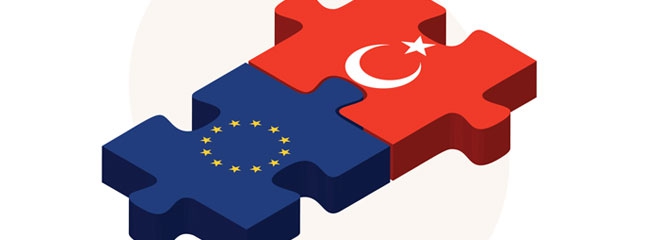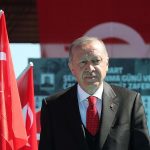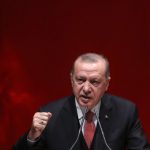- The European Parliament recently passed a nonbinding resolution calling on the European Union to suspend long-dormant membership talks with Turkey, underscoring the uneasy relationship between the two sides.
- Turkey has a justified list of grievances against the EU membership process, but in the years since talks stalled, EU accession has become a politically expedient way for President Recep Tayyip Erdogan to denounce the bloc and mobilize voters.
- Turkey will be election-free until 2023 after municipal elections are held March 31; if Erdogan and his ruling party come out on top, practical necessities will likely motivate each side to attempt a rapprochement of sorts.
The European Parliament, citing Turkey’s deteriorating human rights record, passed a nonbinding resolution on March 13 calling on the European Union to suspend its membership negotiations with Ankara. The symbolic vote will not result in the European Commission formally suspending or even ending Turkey’s accession process. However, it is a clear signal that Turkey and the European Union are at a stalemate. Ankara’s flagrant disregard for democratic institutions, compounded by the purposeful denigration of the rule of law, will serve only to reinforce European prejudices against Turkish accession to the European Union — a process that has been dormant since 2007.
From Grievances to Political Expediency
Turkish President Recep Tayyip Erdogan’s governing Justice and Development Party (AKP) has a long and, in many cases, justified list of grievances against EU treatment of Turkey’s accession process, which has been less than sincere and fair. Although long forgotten, it was Erdogan who positioned Turkey as a credible EU candidate by investing political capital in demonstrable democratic reforms. Furthermore, Erdogan upended Turkey’s flawed and intransigent Cyprus policy of non-negotiation in 2004, and demonstrated clearly that the longest applicant country for EU accession was finally ready to do its homework. In these endeavors, Turkey was shortchanged by a combination of bigoted attitudes on the part of several EU member states that insisted on curtailing the accession process, and by EU institutions themselves, which failed to tangibly recognize the country’s earnest posture during the mid-2000s. Although it cannot be condoned, Erdogan’s vitriolic stance toward the European Union can be attributed to a significant degree to the EU body politic. Had the European Union given Turkey a firm accession date and process from the outset, it is hard to conceive how Turkey’s government would have failed to pursue a defined road map in the same fashion as every other candidate country.
History aside, it is now clear that Erdogan perceives EU accession solely as a way to mobilize voters. The incarceration of democratic and societal peace activists such as Osman Kavala is intended to fly in the face of EU expectations for Turkey and rile up Turkish voters. Kavala and numerous other activists recently received long prison sentences for allegedly participating in the 2016 coup attempt. Erdogan and Turkish Cabinet ministers have rebuked EU objections to the legal process that led to the activists’ imprisonment during public rallies, drawing cheers from angry crowds that feel exuberant that their leaders are hitting back at the European Union. Last week, a small group of AKP supporters declared that the call to prayer from all of the country’s mosques should be interpreted as Turkey’s renewed intention to reconquer Vienna. Hyperbole aside, such developments help underscore the fact that EU accession is no longer a strategic objective for Turkey, but just another political tool that Erdogan’s regime can use to fire up voters.
Erdogan will stick to pushing an anti-EU platform if it helps his party secure victory in upcoming local elections, though he knows this calculation curtails Turkey’s EU membership for at least a generation.
We are accustomed to witnessing vociferous anti-EU sentiments by populist leaders in member states such as Hungary and Poland. However, neither Hungarian Prime Minister Viktor Orban or Jaroslaw Kaczynski, the leader of Poland’s ruling Law and Justice party, are actually interested in pulling their countries out of the European Union. In fact, they consciously derive considerable benefits from the bloc, while at the same time pushing a fierce anti-elitist and xenophobic rhetoric that pleases their voter bases. In Turkey, the opposite is observable: Erdogan’s political calculation is based entirely on one notion: If pushing an anti-EU platform, continuing to erode the rule of law and threatening to reinstate the death penalty helps secure victory in Turkey’s local elections on March 31 and/or maintain his personal electoral standing, then he considers it a win. Erdogan sticks to this calculation though he knows it curtails Turkey’s EU membership for at least a generation. Medium- to long-term considerations about reinforcing the rule of law and substantive democratic governance have no immediate payoff for the country’s governing elite.
Practical Necessities
What, then, is Turkey’s EU policy? Assuming that Erdogan and the AKP come out on top following the March 31 municipal elections, Turkey is not scheduled to hold any new elections for another four-and-a-half years. A manageable rapprochement will likely be attempted by both sides. Turkey has long been interested in renegotiating the Customs Union with the European Union that it has been part of since 1996 to include its agricultural exports. Furthermore, Turkey also desires visa-free travel to the European Union for its citizens, which is particularly relevant to Turkish businesses with European investments. On the other hand, the European Union is interested in working with Turkey to prevent present and future refugee flows from the Middle East.
Somewhat underplayed in the mainstream media is the large-scale exposure European banks have in lending to Turkey. Many European banks, particularly in Spain, have provided Turkey with vast sums of credit. On account of Turkey’s worsening economic slowdown, there are heightened fears that these debts cannot be honored. The European Union, along with other international crediting agencies, is interested in avoiding a regional — even global — contagion of debt defaults by developing economies, possibly sparked by Turkey. There is a broad consensus among financial analysts that Turkey is too important to let fail and it is likely that Erdogan is aware of this. Although the notion of EU accession is unrealistic at this point for Turkey, so is the formal termination of the process. Practical necessities will require the two sides to grudgingly find ways to coexist.
Source: Strafor



